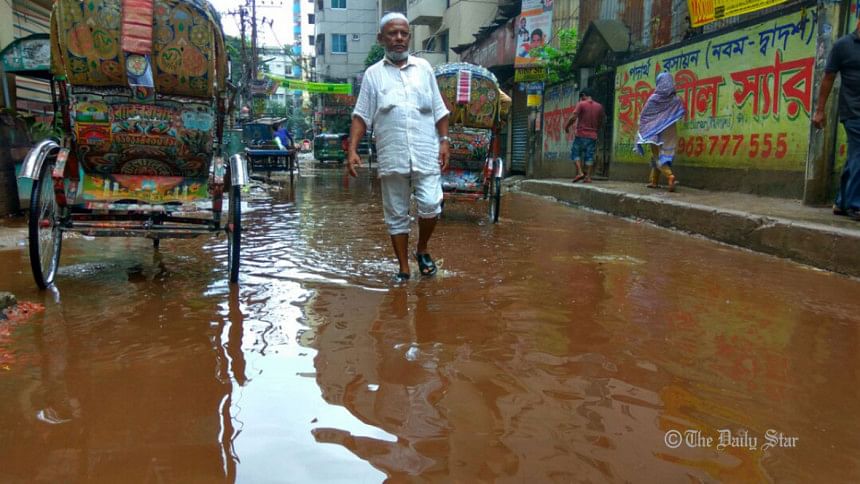Water-logging in some areas hampers city cleaning

Waterlogging at different parts of the city is nothing new, but on eid day it took on a new shade as the rainwater got mixed with the blood of sacrificed animals.
Roads in Shantinagar, Malibagh, Nayapaltan and Gandaria, some of the areas which experience frequent waterlogging, went under red water on the Eid-ul-Azha this year.
Environmentalists say the blood of the sacrificial animals on the open road creates serious health as well as environmental hazards.
This issue even drew the attention of different international media including AP, The Guardian, BBC, The Independent, The Washington Post, The Times of India and India Today as they ran stories on it.
People usually offer their sacrifices on the roads or open space in their garages. When they wash the blood, it ends up in different drains.
Experts say this year the blood became
visible due to the heavy rain and subsequent waterlogging.
The city corporations designated more than 1,200 places for slaughtering sacrificial animals, but people did not go there due mainly to bad weather.
However, the places were also not suitable to manage the blood as those were offered to city people on a temporary basis without developing a system to manage everything properly.
Around 3.5 lakh cattle were slaughtered during the Eid-ul-Azha in the capital, said officials of the two city corporations.
Iqbal Habib, joint secretary of Bangladesh Poribesh Andolon, said Shantinagar and its adjoining areas were lowland, but the authorities concerned have never taken any long-term measures to solve the waterlogging problem there.
“During normal waterlogging, sewage gets mixed with rainwater… ,” he said.
But when the water gets dry, the dirt also gets dry and remains on the road and becomes a threat to health, he observed.
He said people do not understand the impact of waterlogging as it does not occur immediately.
Blood-mixed water may also create health hazards when it dries up and gets mixed with the air, he noted. After around two to three weeks, many people may face different health related issues like allergy problems, fever or coughing, he added.
Iqbal suggests recovering canals like Manda, Segun Bagicha and Khilgaon-Basabo and ensuring proper flow in those to solve the waterlogging problems.
Additional Chief Waste Management Officer of Dhaka South City Corporation Khondokar Millatul Islam said as people did not sacrifice their animals at the designated spots, blood of the animals got mixed with the rainwater.
He said they cleaned the roads of waterlogged areas with bleaching powder and Savlon water after rainwater had receded the next day.
A project has already been initiated to solve the problem of Shantinagar and work would start after the rainy season, he added.

 For all latest news, follow The Daily Star's Google News channel.
For all latest news, follow The Daily Star's Google News channel. 



Comments